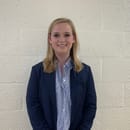Maddie Douglas is a freshman at Wake Forest who has lived all over the globe. Moving every two to three years due to her family’s involvement in the U.S. Military and State Department, she has been immersed in vastly different cultures on three continents. Before landing in Winston-Salem, she lived in Nairobi, Brussels, DC, and London. She reflects on her unique experiences and gives Her Campus the inside scoop on what it’s like to be a true world traveler.
HC: What has it been like living around the world?
MD: So I move every two to three years and it is really hard at times, because you don’t always expect to feel culture shock (especially for me because when I’m moving back to the United States, I think of it as home), so it has been hard in some ways. But it has also been really formative for me because it has given me the opportunity to not only observe other cultures, but to immerse myself in them and really experience them.
HC: How does each culture you’ve lived in differ from US culture?
MD: I feel like every place I’ve lived is so different. In Kenya people were so happy all the time, no matter how little or how much they had. They were the most joyful people I had ever experienced. In Brussels, the country is actually split between Flemish and Walloon people and so there is a little bit of tension there. Just observing how different subcultures interact with each other differs from American culture. I feel like in the States you have the North and the South and East Coast and West Coast, but just seeing different subcultures interact is very different from the U.S.
HC: How did your education and school experience in each country compare to one another?
MD: When I lived in the U.S. for the first time, I mainly went to school with Department of Defense kids, but I wasn’t really of schooling age yet. In Kenya, I went to a missionary school, and it was really interesting because it educated me about my religion through a servant mindset, rather than a dogmatic one. In Belgium, I went to an international school but most of the student population spoke French, so I was constantly immersed in a foreign language for the first time. I loved that, because it showed me that language has the ability to link many different cultures. And then when I lived in the United States for the second time, I went to a really traditional Christian school, and I found it excessively rigid. It wasn’t a learning environment that really worked for me, and I also experienced a lot of unexpected culture shock. I just thought that I was moving home and I wouldn’t have to experience any culture shock, but I did, and it was very isolating. In London, I went to an American school, which is basically an international school with an American curriculum, and I really liked that because I had the opportunity to enjoy a different level and a different type of independence that I wouldn’t have gotten in an American high school.
HC: Where was your favorite place to live and why?
MD: I really loved living in Kenya, because it was just every child’s dream life. I had monkeys coming to my classroom and we would climb trees with them. It was a really fun place to enjoy my childhood.
HC: Have your international experiences had an impact on where you might want to study abroad or where you want to live after you graduate?
MD: Yes definitely – I’m really tired of moving around. I’ve loved it, but moving every two to three years is really hard. College will be the longest I’ve ever lived anywhere, so I don’t think I am going to study abroad. Instead I’m going to take the opportunity to finally be able to invest in the community that I’m placed in. But once I graduate, I do want to go back overseas. I’m tired of change now, but I know after a while I will crave it, because it’s just something I’ve always had in my life.
HC: Are you fluent in any foreign languages or do you want to be when you graduate from Wake?
MD: Yes, at one point I was conversant in Swahili, but I have lost all of that. For French, I pretty much gained fluency two years after living in Belgium (so a total of four years after starting French). But I’ve lost a lot of it, so I hope to gain that level of fluency back by the time I leave Wake.
HC: Has living around the world influenced what you want to study?
MD: I definitely know that I want to have an international career (I know that’s very broad), but the international community is something that I’ve been a part of my whole life, and I really enjoy having the opportunity to interact with people whose cultures differ from mine.
HC: What is the most important thing you have learned from your experiences in these different countries?
MD: Never expect not to experience culture shock.
HC: Do you have a country or city that you hope to visit next?
MD: I would like to visit Petra in Jordan!



